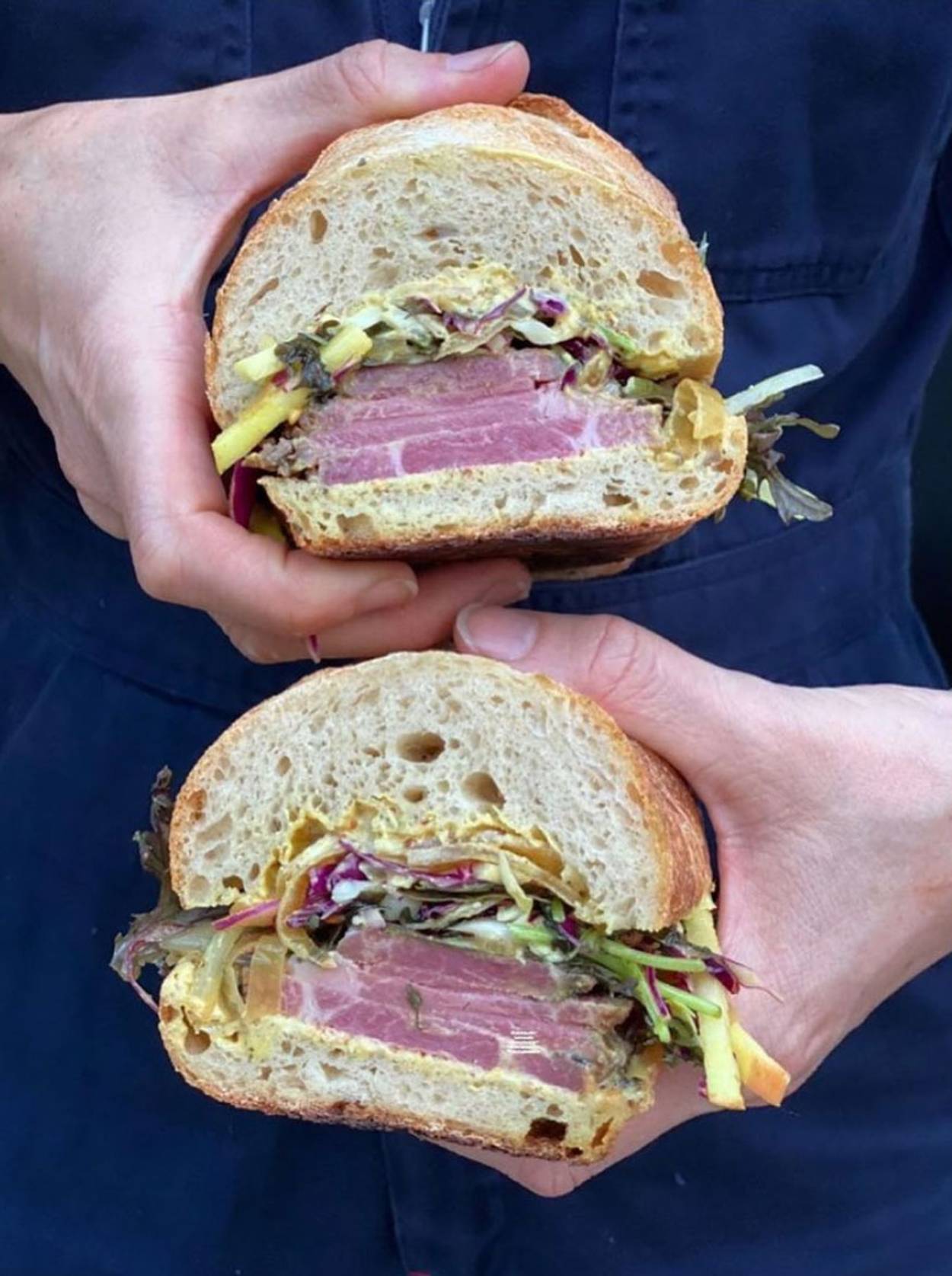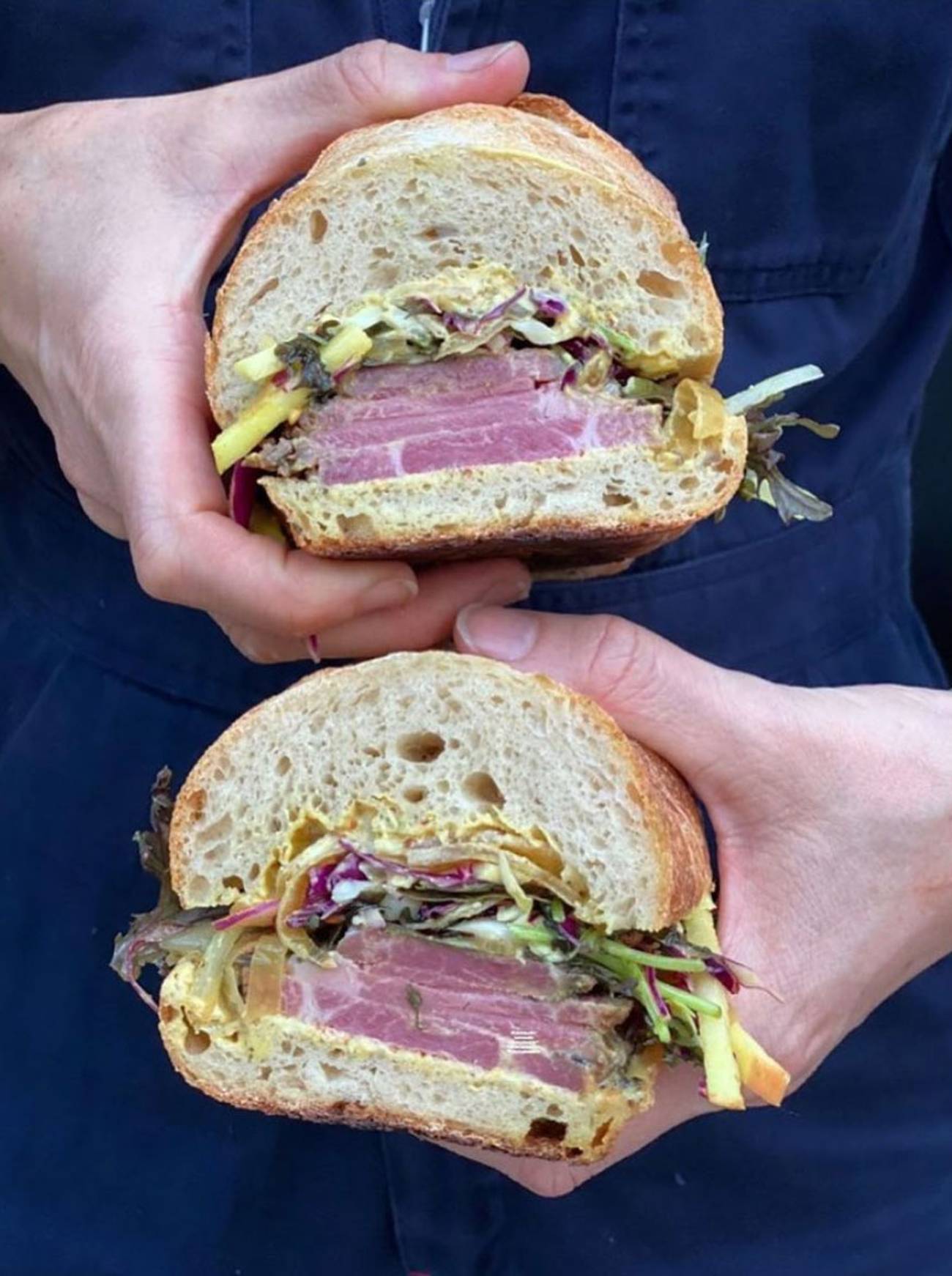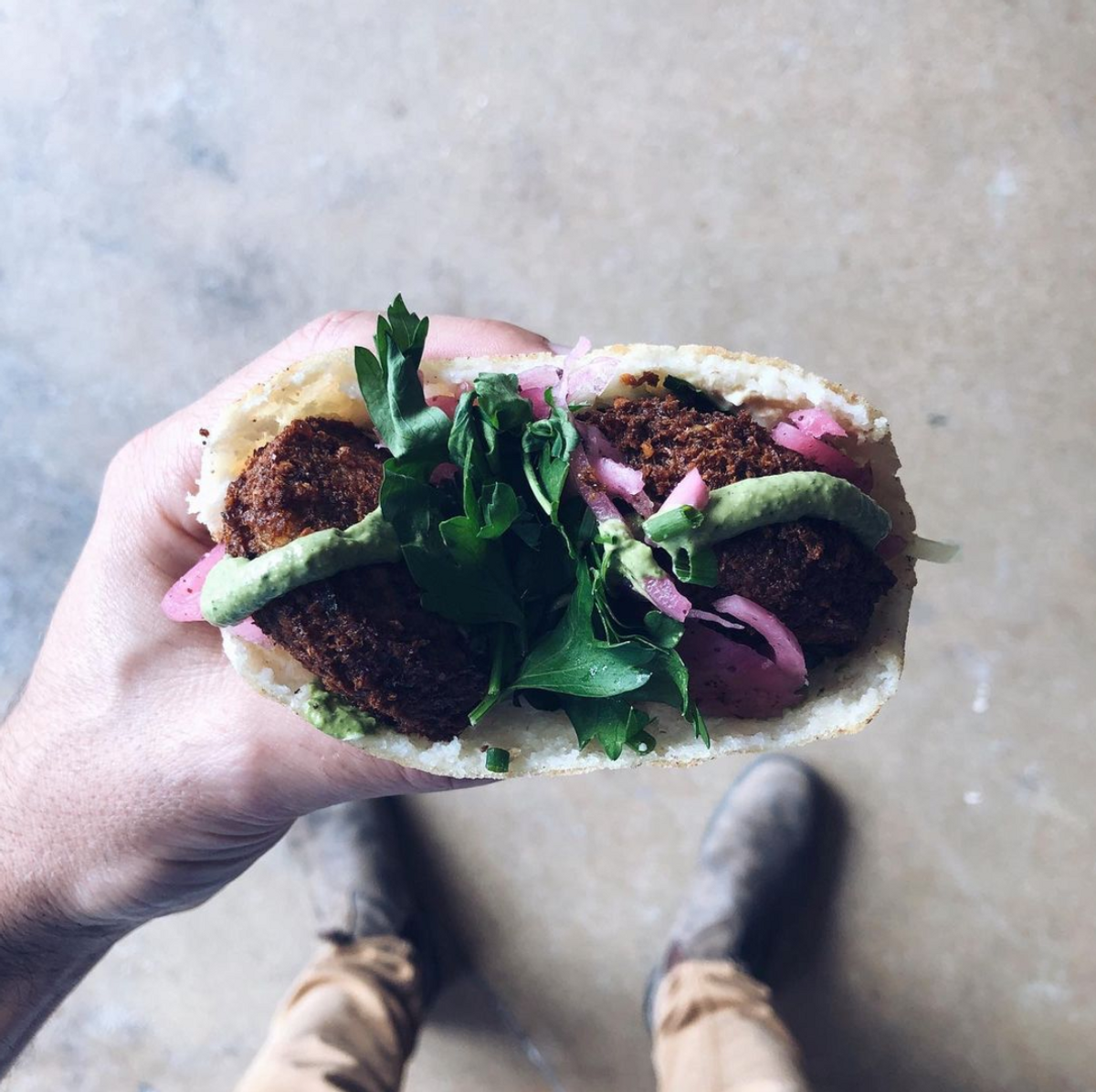New Ideas Pop Up on the Jewish Food Scene
As restaurants face an uncertain future, chefs get creative




When COVID-19 appeared in March, restaurants closed, planned openings went on a hiatus, and bartenders and servers were left without work. While Jewish delis and Israeli restaurants were no exception, survival mode and the industry’s new normal—informal pop-up formats, delivery-only models, and curbside pickup ventures—have pushed the creativity of Jewish chefs, as gonzo pop-ups, inventive delis, and curious spinoffs have started appearing across the U.S.
Self-taught Los Angeles-based chef Rebecca King has been hosting a sandwich pop-up from her front porch since December 2019, but COVID-19 gave her business a welcome push. “COVID-19 sucks, it’s a nightmare, but it has also brought people together, reminded us that we can be creative and restructure,” she said. King’s pop-up, The Bad Jew, is all about house-cured, decidedly unkosher, deli-style meats. Since March, she’s been much more active, partnering with local restaurants and delis for limited-availability events. Most recently, she joined the team at the popular Highly Likely Cafe for a day of lamb pastrami sandwiches with zhug and mayo, and pork pastrami with mustard and yuzu, inspired by produce from the Santa Monica local farmers market. “It’s going a lot better than I expected, as people in the industry are willing to collaborate more,” she noted. The pandemic, King says, has been a fertile ground for her rebellious Jew-ish pop-up: “It’s this end-of-the-world mentality—let’s just try it, let’s see what works,” she said. Customers, hungry for excitement, and excited to eat outside in an informal setting, have been equally ready to try new things.
While King’s larger-than-life sandwiches are nomadic, popping up in different locations in Los Angeles, some Jewish restaurants have turned to semipermanent pop-ups that push the envelope. (The differences are subtle; a proper pop-up appears in different restaurants and bars, or even parks and shops, on an irregular schedule, advertised primarily on social media. A semipermanent pop-up might be an ongoing but temporary venture that has settled, for a limited amount of time, into a single location, without the commitment to occupy it for good.) The beloved Miami establishment Zak the Baker launched a falafel pop-up with hummus shawarma and babka-flavored custard sundaes, and in Washington, D.C., Delikatessen, a Jewish pop-up selling sardines on bagel chips, took over one of the two locations of the pizza chain All-Purpose. The falafel offering exists alongside the existing business, offering a limited-edition menu, but occasionally—as with Delikatessen, which has since closed—a pop-up might take over a corner of a bar or a restaurant, or even take over the whole space, while the original business still holds on to the lease.
In Brooklyn, Paulie Gee, a pizzeria, has been hosting Edith’s, a Jewish bakery pop-up, since August. Behind it is Elyssa Heller, an operations manager for food brands. On the menu, you’ll find honey baharat schnecken and shakshuka morning buns, brisket buns and chocolate sesame twists. Low stakes—the low overhead, and the fact a pop-up is by definition temporary and experimental—make for braver decisions, and for Heller, this meant finally taking the steps to make Edith’s happen. “The project was started pre-pandemic and when COVID-19 hit, I had already invested my savings to get Edith’s off the ground and figured I might as well just keep moving forward,” she said. Heller reached out to the owner of Paulie Gee. “He was interested in the concept, but admitted that if it was pre-pandemic, he would have been too busy to really take it on. In this way, everything aligned,” she said. For Heller, the pandemic has been a litmus test for focus and precision: “We originally had a lot more that we wanted to do but just wasn’t possible in the current climate. It was a really great learning lesson to just do less, but do it really well.”

In San Francisco, the fine-dining establishment One Market has recently launched Mark ‘n’ Mike’s, making chef Michael Dellar’s dream of opening a Jewish deli in the city a temporary reality. Across the city, Corridor, a restaurant that, prior to the pandemic, was serving classy Californian fare, tapped its sous-chef Beth Needelman to create a delivery-only pop-up to lure back customers. In creating Schmaltz, Needelman turned to her heritage; “I wanted to bring a sense of family at a time when everyone’s down on themselves,” she said. Relying predominantly on delivery platforms has made her menu bolder and quirkier, with better looking, photogenic offerings; think Reuben meatballs, stacked potato latke chicken sandwiches, and a striking two-color beet hummus and harissa-dill labneh “schmear.” “The pandemic is changing everything minute by minute; make a plan and then change it,” she said with a laugh, “so you have to use the opportunity and keep the interest flowing.” Currently, after briefly pivoting to meal kits, Needelman is considering her options—perhaps, with time Schmaltz will become a dinner series, or a permanent restaurant.
For Chicago-based Ursula Siker, this is already a reality; her new Jewish eatery, Jeff & Judes, had settled in a permanent location back in August, amid the pandemic. Siker describes the current stage as “extended soft opening”; since the launch the demand has been so high, she had to pause curbside pickups to make time for training additional staff. When Jeff & Judes reopens on Nov. 5, customers can expect such unusual items as a sweet potato and pimento cheese knish, or perhaps matzo fried chicken or corn flakes kugel—all items Siker has been selling out of in recent months. She has COVID-19 to thank for some of these daring combinations. “It’s been interesting because our entire restaurant business is based on Instagram, so we experiment with exciting things,” Siker said. Her approach to cooking has been more relaxed due to the current atmosphere, which can’t be bad for creativity: “If something looks ruined, you make the most of it. It’s very similar to how we live our lives now,” she said.
This type of nothing-to-lose attitude, mixed with looser dining rules and, quite possibly, lower expectations from the clientele—who hasn’t found joy in just being fed by someone else these days, never mind the dish?—has proven to be a powerful fertilizer for a new crop of young and exciting Jewish food businesses. It doesn’t hurt that deli fare has instant comfort folded into its DNA, and, according to Siker, “translates so well for delivery.” Will unorthodox knishes, Reuben meatballs, and lambstrami stick around for good? Maybe. For now, as Edith’s slogan says, “We’re here for a good time.”
Flora Tsapovsky is a San Francisco-based food and culture writer.